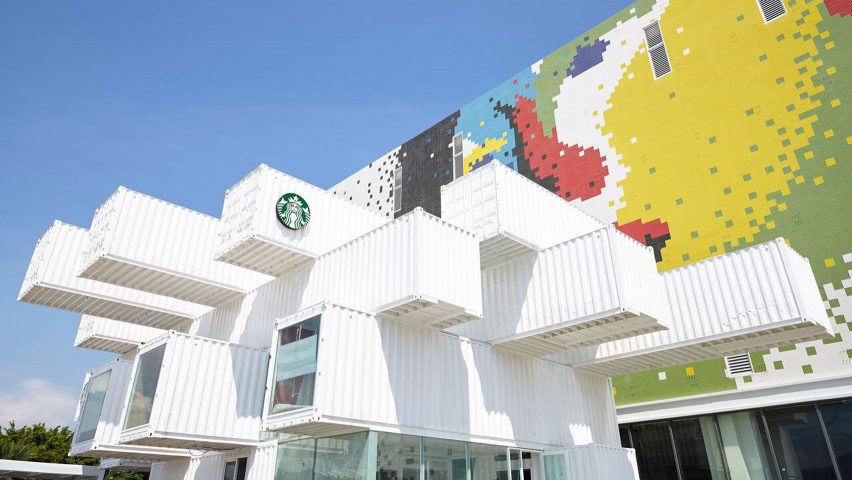Japanese architect Kengo Kuma has stacked 29 recycled shipping containers to make a Starbucks coffee shop alongside a shopping centre in Hualien, Taiwan.
The multi-storey structure has full height windows and skylights set into the white-painted containers to create a 320-square-metre cafe.
Containers stacked four high at right angles to each other abut the soon-to-open Hualien Bay Mall, with glazed mezzanine levels connecting the interior spaces. The instantly-recognisable round green icon with the Starbucks two-tailed mermaid is fixed to one side of the top-most container.
Kuma arranged the containers to reference the spreading foliage of coffee trees and traditional Chinese bucket arches – the layered brackets set between the column and crossbeam under the eaves of historic palaces and temples.
A window in a ground floor container next to the road allows drivers on the Nanbin Road to collect their coffees to-go.
Pedestrian visitors enter through a glazed lobby and can enjoy their beverages in cosy wood-lined booths or at low tables and benches lining the galleries between containers.
It is one of over 45 container coffee shops owned by the brand, which is investing in these pre-fabricated modular stores as part of its drive for increased sustainability.
The Taiwan store is the first time that Kuma has used shipping containers in his work. He previously designed Starbucks Dazaifu in Fukuoka, Japan, using 2,000 thin wood batons to create a latticed interior.
A Kengo Kuma-designed Starbucks Reserve Roastery, an immersive retail experience for the brand, is due to open in Tokyo later this year.
Shipping containers provide a versatile pre-made module for architects around the world. In Ohio, USA, Jonathan Barnes Architecture and Design turned a shipping container on it's end to create a parking booth tower, and in Amsterdam Edward van Vliet inserted one into a crane to create an unusual holiday apartment.
Photos courtesy of Starbucks.

